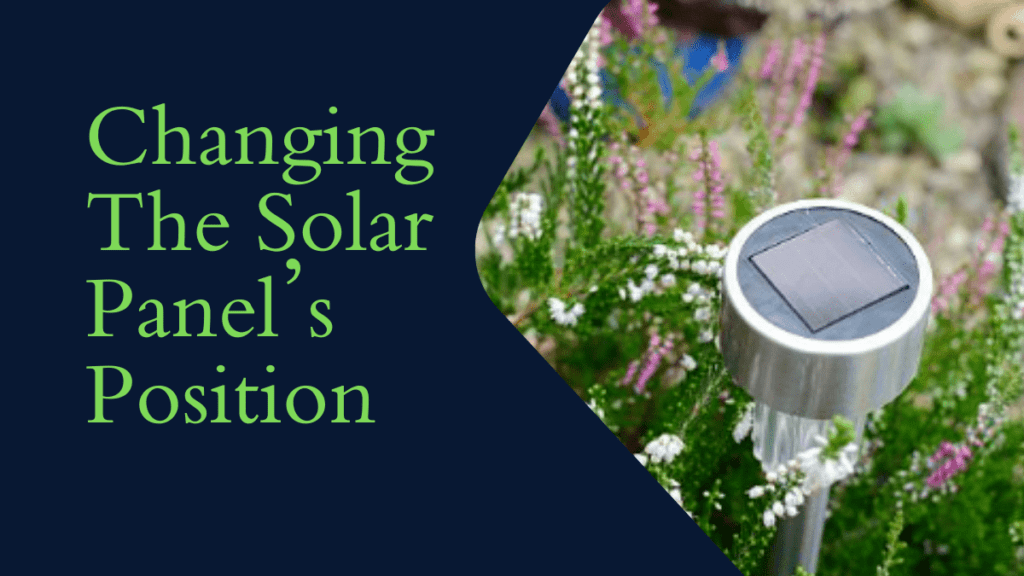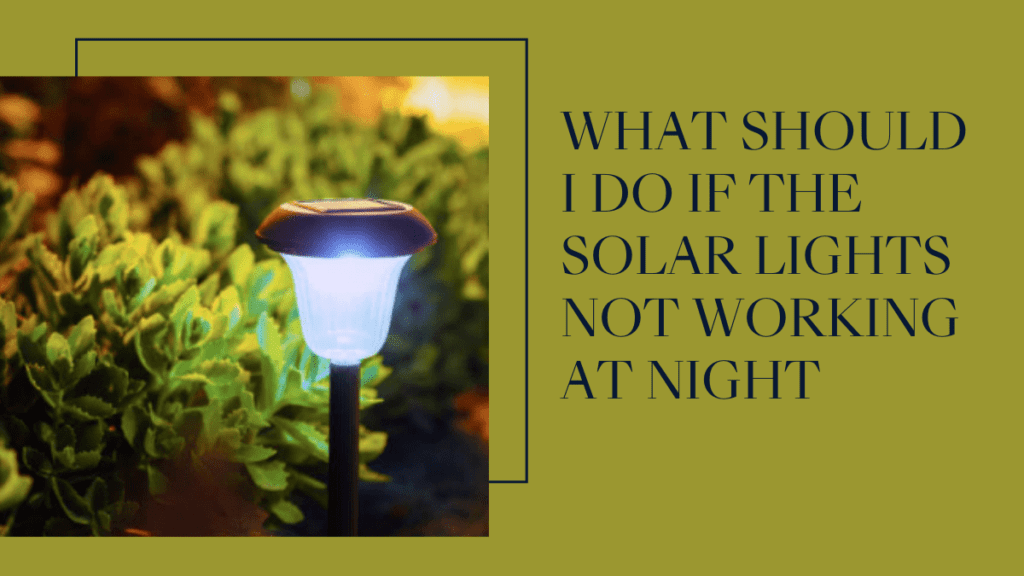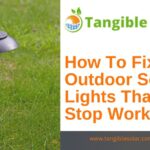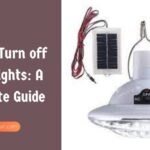Solar Lights Not Working At Night? Issues and Solutions
Solar lights not working at night are becoming more popular. While they are most recognized for being cost-effective, installing and utilizing them also helps to conserve and save the environment.
However, it may be quite annoying to discover that your solar-powered lights are not performing properly. The most prevalent problem is that solar lights do not function at night. But did you know that repairing it is rather simple?
Solar lights rely on sunshine, and if there isn’t enough of it or it’s variable, the lights may function intermittently or not at all. That is just one of the reasons your solar lights may not be operating at night. There are various reasons why your solar lights aren’t working properly, and if you’re seeking solutions, we’ve got you covered. Best Outdoor Solar Lights For Signs
Solar Lights Not Working At Night: Reasons and Solutions?
We’ve listed various reasons why solar lights don’t operate at night, along with solutions for each.
Is the solar panel covered?
Solar lights, by definition, are turned off during the day to convert light into energy and store it in the battery before being turned on at night when it becomes dark. If the lights do not come on even after it has grown dark, try covering your solar panel. If the lights eventually come on, it is very obvious that another source of light is hitting the solar panel and fooling it into believing it is still daytime.
For example, if the solar panel is too close to a street light, it may misinterpret it as sunlight. The answer is straightforward. All you have to do is adjust the panel so that no other light shines through it. This should allow the light to resume regular operation.
Are you checking to see if the unit is turned on?
Let us begin with the obvious. As ridiculous as it may seem, most of the time, the simplest of things may be the cause of problems.
Worse, we often disregard the possibility of fundamental issues. People often believe that once their lights are installed, they are ready to go.
In general, solar lights feature a button that must be turned on for the lights to function at night. If the switch is turned on, properly inspect it. If it is turned on and the problem persists, we must move on to the next tip.
Pulling the battery tab
Many individuals are unaware that when they purchase their first solar-powered light, the battery will include a pull tab. This tab must be removed for the light to work appropriately. Check to see whether the tab is still present on the battery; if it is, you must remove it.
Changing the solar panel’s position?

The location of your solar panel also has a significant impact on how the light functions. For the solar lights not working at night to function properly, the panel should be positioned in such a way that it can absorb as much sunlight as possible throughout the day. The solar panel must be exposed to direct sunlight for at least six hours for the light to function properly.
The ideal orientation for the solar panel is toward the south. This allows sunlight to be absorbed throughout the day, from sunrise to dusk.
The angle at which you set it also makes a difference. This is especially crucial when the amount of sunshine in the sky decreases. If your solar light has an adjustable panel, just raise it to a 45-degree angle.
How do I clean a solar panel?
Solar lights are often installed outside the home, which means that the panel is frequently coated with dust and filth. This dust and debris may make it difficult, if not impossible, for the panel to absorb the sun’s rays. This has a huge influence on how much charge the battery can get, which impacts how the lights perform.
As a result, you must clean the solar panel at least once a week. You may remove the dirt and dust with a moist paper towel.
To remove more stubborn filth, dilute dishwashing liquid in water and gently wipe the panel clean. If you are overly forceful with the cleaning, you may wind up harming the solar panel.
Is it a wiring issue?
The degradation of the cabling that links the solar panel and the lighting system over time is one of the reasons why solar lights do not perform well in general, especially at night. This might be due to extreme weather or damage caused by hazardous animal pests.
It is a frequent and inevitable cause, although it may be avoided with routine maintenance.
Are you using a mains charger?
You might also try putting a mains charger into the light or removing and charging the batteries. While this may seem like a smart idea, it might quickly backfire if you don’t use the suitable main charger that came with the light.
Keep in mind that solar panels typically have a fixed voltage. If the mains charger isn’t right, the electronics could burn out or the batteries could get too charged. If this occurs, you’ll have to say goodbye to your solar lights and get new ones. If you aren’t sure what to do and have questions, please look at the user manual or try to get more information from the company where you bought the solar light.
Behind the glass, charging the lights?
We can feel the full impact of the sun when we sit behind glass, but this does not always apply to solar panels. Double- or triple-glazed windows are becoming more prevalent, and if you install the solar light behind glass, the sun’s rays striking the panel will be rendered ineffective.
It is always a good idea to position the solar panel outside of any glass and in a location that gets enough sunshine. Remember that the fewer obstacles between the solar panel and the sunshine, the better the batteries will charge. As a result, the lights will remain illuminated throughout the night.
Stripping or battery seating?
Speaking of batteries, another reason your solar lights may not be operating at night is if the batteries were not properly installed. The solar panel loses all of the sunlight it receives if the batteries are not in contact with the terminal connections because the battery cannot charge.
If a loose battery is the cause of this problem, you must deeply charge your batteries before they can power the light.
What about the panel issue?
The failure of solar lighting has nothing to do with dirty panels. However, if the panels get dirty with dust, debris, and so on, they will be unable to receive the full quantity of sunshine. It has the potential to diminish the amount of electricity that the panel can produce and store, lowering the efficiency of the lighting. This is a typical cause, and regular maintenance may help you cope with it.
What about the light sensor issue?
Dust, trash, tiny particles, and pollen may cover and obstruct the light sensor, lowering its sensitivity. When the light sensor fails to operate properly, it is unable to determine whether it is day or night or day outside and hence fails to function. Ambient lighting, such as high-pressure bulbs, may also affect the sensitivity of the light sensor.
What about the pricing issue?
Your solar lights might not be receiving enough sunlight to charge, which would explain the charging issue. In other words, the lights’ positioning keeps them out of direct sunlight.
Long stretches of cloudy or rainy weather or gloomy days with little sunshine may also be to blame for the problem. Furthermore, the positioning of the bulbs may be a factor. The more exposed they are to the light, the more energy they can store and the more effectively they can operate after the sun goes down.
What about the light bulb?
If the bulbs are burned out, the issue will occur. Your solar lights might not be receiving regular maintenance as a result of this. Another unwelcome contributor is failing to choose the proper bulb to replace the burned ones. To correct this, remember to thoroughly read the handbook before selecting the bulbs. Give the lights routine maintenance when selecting the proper ones. As a result, your lighting will perform optimally.
What about the battery issue?
The major reason for the dead battery is a battery malfunction. This issue is easy to discover and repair. However, choosing the proper kind of battery to replace the old ones takes some technical understanding. For those of you who are unfamiliar with solar lights, newer models often include pulling tabs linked to the batteries.
What Should I Do If the Solar Lights Are Not Working at Night?

This post will provide you with information on how to resolve the issues. You must first understand the issues, and then you must be able to address them one by one.
First, learn about the issue.
If your solar lights are not operating at night, the six explanations listed below may be of assistance to you. Solar lights differ in brand and type, but the essential components and operation are the same. As a result, you should carefully study the instructions or look for this information online. Although it is free, you should know it like the back of your hand. Then, from the outside in, inspect the wire, the panel, the sensor, the placement of the lights, the bulb, and the battery. Remember to examine them one by one since they are six of the most prevalent reasons for malfunction.
Handle them one by one.
You are now ready to repair the issues once you have thoroughly investigated them. If there are any issues with the cables, such as loose cords, you should plug them in securely.
When anything goes amiss with the panel, check to see if there is any dust or dirt to wipe away. Replace the bulb and the batteries regularly. Keep in mind to position the lights in direct sunlight and away from any neighboring artificial lighting.
Switch the switch to the on position.
Many solar lamps have an on/off button for complete control of the light. Locate the switch and ensure it is turned on. This enables the light to charge throughout the day and function at night.
Should I charge the batteries if the solar lights are not working at night?
When charging your solar lights that are not working at night, always follow the manufacturer’s recommendations. Take note of the time needed for a complete charge.
Solar lights, in general, should be placed where they can get direct sunlight for at least 8 hours every day. Are there any trees or structures that are obstructing the sunshine and preventing the batteries from charging entirely throughout the day? Can the lights be moved? You must monitor the lights throughout the day and make modifications as needed.
Seasonal fluctuations and weather patterns are further factors to consider. During the winter, sunlight may be restricted, which may affect battery charging. An overcast sky will produce a similar impression.
The performance of the light will suffer if the batteries are not properly charged. If sunshine is not accessible, you may need to look into alternative ways of charging your solar light batteries.
Inspect the light for visible damage.
If your solar lights are not functioning, you should visually examine the solar panel, housing, and lens of the solar lights. Inspect these components carefully for cracks and other indications of deterioration.
If you left the unit outside for a lengthy period, extreme weather conditions might have caused discoloration, fractures in the casing, or corrosion of metal components.
Moisture may enter via a broken housing, causing internal components to fail. Unfortunately, the light will have to be replaced in many circumstances.
Should I clean the solar panels?
If required, the panel on the new solar lights should just need a simple cleaning. Wipe away any loose dust or dirt with a dry, soft cloth.
Solar lights with a long history of installation may have fogged solar panels. This may have an impact on the charging of the battery as well as the functioning of the lights.
To begin, remove dust and dirt using a soft cloth. If a more thorough cleaning is necessary, soak a cloth or sponge in mildly soapy water, drain off the excess moisture, and wipe the solar panel. After cleaning the solar panels, you may put the light to the test.
How Do You Put Solar Lights To The Test?
To test your solar lights, open the housing or battery compartment and check the batteries. Before opening the lamp, check with the vendor to see whether it will invalidate your warranty. If you must turn on the light, proceed with care.
Is the sensor operational?
Outdoor solar lights are often outfitted with a light sensor for nighttime operation. However, if the power switch is turned on, the light sensor activates.
The light sensor in some solar lamps is placed in the solar panel. Cover the solar panel to imitate darkness to test the sensor. If the batteries are fully charged, the light should turn on.
The light sensor in motion sensor solar lights may be hidden behind the frosted glass. To test it, cover the lens or take it into a dark room. If the light turns on, the sensor is operational.
Should the batteries be replaced?
If you have completely charged the batteries but believe they are the cause of your lights not functioning, we suggest that you do a test. The batteries in the lamp may be removed and replaced with standard alkaline batteries. Please keep in mind that this will only be feasible for select solar lights and should only be done for testing purposes.
While standard alkaline batteries are the correct size, they are not suitable for long-term usage. Remember to remove any alkaline batteries after testing and replace them with the appropriate kind of batteries according to the manufacturer’s recommendations and instructions.
Use high-quality batteries for brighter lights and longer illumination durations. Batteries that aren’t very good will only be able to hold a very small amount of energy, which will make it hard for the light to work at night.
Please keep in mind that removing and replacing batteries may invalidate the warranty on the solar lights. It is advised that before participating in such activities, you contact the vendor.
Should I contact the retailer?
Most solar lights come with a limited warranty. It is important to know how long the warranty on any solar lighting you buy lasts. In certain circumstances, you may need to contact the store.
Contact customer care and offer a detailed explanation of the issue. Based on your description of the situation, a customer care representative will be able to give you help. Furthermore, shops normally have a return policy in place for devices that come damaged or broken. Replacement solar lights may be sent to you in a matter of days.
Replacement batteries for your solar lights that are not working at night may be available from the supplier. Give the vendor the name and model of your solar lights, as well as any battery-related information. If batteries are not in stock, the shop might provide suggestions for alternative suppliers.
Is it time to upgrade?
If you’ve had your solar lights for a long time and they’ve stopped functioning, they may have reached the end of their useful life. In general, the batteries in outdoor solar lights are projected to last 3–4 years before needing to be changed.
LEDs have a lifespan of 10 years or more. If your solar lights aren’t functioning, this may be a good time to update. Newly-made solar lights will include cutting-edge technology and increased efficiency. Is it worth attempting to repair your old lights, or should you replace them? That is something you should think about.
If you decide to buy new lights, we can advise you on the finest solar lighting for your requirements.
When Everything Else Fails, Are Solar Lights Not Working At Night?
If you’ve tried many of the suggestions above and your lights still don’t work at night, the best answer is to contact the manufacturer and ask for assistance. It is crucial to emphasize that each brand has a unique purpose that only a specialist from that company can evaluate. They will be able to comprehend the problem and discover a solution much faster.
Conclusion
Solar lights not working at night or not functioning at night is not a major problem, and we are certain that at least one of the solutions we have suggested will work. Maintain your solar lights regularly to ensure that they are in good working order.




